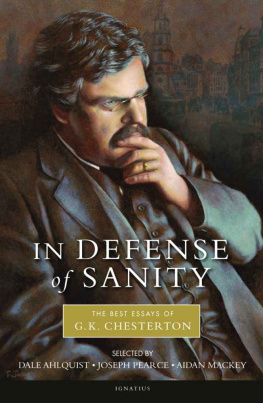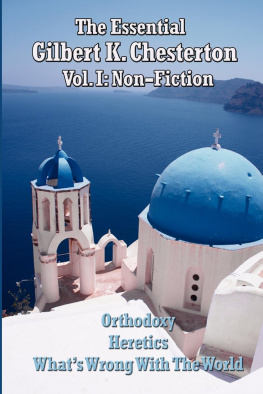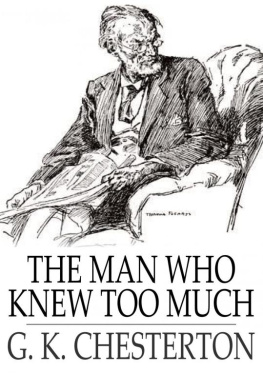THE SUPERSTITION OF DIVORCE
| BY THE SAME AUTHOR |
IRISH IMPRESSIONS
HERETICS
ORTHODOXY
THE CRIMES OF ENGLAND
A SHORT HISTORY OF ENGLAND
ALL THINGS CONSIDERED
GEORGE BERNARD SHAW
MAN ALIVE
THE FLYING INN
THE BALL AND THE CROSS
THE INNOCENCE OF FATHER BROWN
THE WISDOM OF FATHER BROWN
THE NAPOLEON OF NOTTING HILL
POEMS
THE BALLAD OF THE WHITE HORSE |
THE SUPERSTITION
OF DIVORCE
BY
G. K. CHESTERTON
AUTHOR OF
HERETICS, ORTHODOXY, IRISH IMPRESSIONS, ETC.
NEW YORK
JOHN LANE COMPANY
MCMXX
Copyright, 1920,
By John Lane Company
Press of
J. J. Little & Ives Company
New York, U. S. A.
Introductory Note
The earlier part of this book appeared in the form of five articles which came out in the New Witness at the crisis of the recent controversy in the Press on the subject of divorce. Crude and sketchy as they confessedly were, they had a certain rude plan of their own, which I find it very difficult to recast even in order to expand. I have therefore decided to reprint the original articles as they stood, save for a few introductory words; and then, at the risk of repetition, to add a few further chapters, explaining more fully any conceptions that may seem to have been too crudely assumed or dismissed. I have set forth the original matter as it appeared, under a general heading, without dividing it into chapters.
G. K. C.
THE SUPERSTITION OF DIVORCE
I.The Superstition of Divorce
I T is futile to talk of reform with reference to form. To take a case from my own taste and fancy, there is nothing I feel to be so beautiful and wonderful as a window. All casements are magic casements, whether they open on the foam or the front-garden; they lie close to the ultimate mystery and paradox of limitation and liberty. But if I followed my instinct towards an infinite number of windows, it would end in having no walls. It would also (it may be added incidentally) end in having no windows either; for a window makes a picture by making a picture-frame. But there is a simpler way of stating my more simple and fatal error. It is that I have wanted a window, without considering whether I wanted a house. Now many appeals are being made to us to-day on behalf of that light and liberty that might well be symbolised by windows; especially as so many of them concern the enlightenment and liberation of the house, in the sense of the home. Many quite disinterested people urge many quite reasonable considerations in the case of divorce, as a type of domestic liberation; but in the journalistic and general discussion of the matter there is far too much of the mind that works backwards and at random, in the manner of all windows and no walls. Such people say they want divorce, without asking themselves whether they want marriage. Even in order to be divorced it has generally been found necessary to go through the preliminary formality of being married; and unless the nature of this initial act be considered, we might as well be discussing haircutting for the bald or spectacles for the blind. To be divorced is to be in the literal sense unmarried; and there is no sense in a thing being undone when we do not know if it is done.
There is perhaps no worse advice, nine times out of ten, than the advice to do the work thats nearest. It is especially bad when it means, as it generally does, removing the obstacle thats nearest. It means that men are not to behave like men but like mice; who nibble at the thing thats nearest. The man, like the mouse, undermines what he cannot understand. Because he himself bumps into a thing, he calls it the nearest obstacle; though the obstacle may happen to be the pillar that holds up the whole roof over his head. He industriously removes the obstacle; and in return the obstacle removes him, and much more valuable things than he. This opportunism is perhaps the most unpractical thing in this highly unpractical world. People talk vaguely against destructive criticism; but what is the matter with this criticism is not that it destroys, but that it does not criticise. It is destruction without design. It is taking a complex machine to pieces bit by bit, in any order, without even knowing what the machine is for. And if a man deals with a deadly dynamic machine on the principle of touching the knob thats nearest, he will find out the defects of that cheery philosophy. Now leaving many sincere and serious critics of modern marriage on one side for the moment, great masses of modern men and women, who write and talk about marriage, are thus nibbling blindly at it like an army of mice. When the reformers propose, for instance, that divorce should be obtainable after an absence of three years (the absence actually taken for granted in the first military arrangements of the late European War) their readers and supporters could seldom give any sort of logical reason for the period being three years, and not three months or three minutes. They are like people who should say Give me three feet of dog; and not care where the cut came. Such persons fail to see a dog as an organic entity; in other words, they cannot make head or tail of it. And the chief thing to say about such reformers of marriage is that they cannot make head or tail of it. They do not know what it is, or what it is meant to be, or what its supporters suppose it to be; they never look at it, even when they are inside it. They do the work thats nearest; which is poking holes in the bottom of a boat under the impression that they are digging in a garden. This question of what a thing is, and whether it is a garden or a boat, appears to them abstract and academic. They have no notion of how large is the idea they attack; or how relatively small appear the holes that they pick in it.
Thus, Sir Arthur Conan Doyle, an intelligent man in other matters, says that there is only a theological opposition to divorce, and that it is entirely founded on certain texts in the Bible about marriages. This is exactly as if he said that a belief in the brotherhood of men was only founded on certain texts in the Bible, about all men being the children of Adam and Eve. Millions of peasants and plain people all over the world assume marriage to be static, without having ever clapped eyes on any text. Numbers of more modern people, especially after the recent experiments in America, think divorce is a social disease, without having ever bothered about any text. It may be maintained that even in these, or in any one, the idea of marriage is ultimately mystical; and the same may be maintained about the idea of brotherhood. It is obvious that a husband and wife are not visibly one flesh, in the sense of being one quadruped. It is equally obvious that Paderewski and Jack Johnson are not twins, and probably have not played together at their mothers knee. There is indeed a very important admission, or addition, to be realised here. What is true is this: that if the nonsense of Nietzsche or some such sophist submerged current culture, so that it was the fashion to deny the duties of fraternity; then indeed it might be found that the group which still affirmed fraternity was the original group in whose sacred books was the text about Adam and Eve. Suppose some Prussian professor has opportunely discovered that Germans and lesser men are respectively descended from two such very different monkeys that they are in no sense brothers, but barely cousins (German) any number of times removed. And suppose he proceeds to remove them even further with a hatchet; suppose he bases on this a repetition of the conduct of Cain, saying not so much Am I my brothers keeper? as Is he really my brother? And suppose this higher philosophy of the hatchet becomes prevalent in colleges and cultivated circles, as even more foolish philosophies have done. Then I agree it probably will be the Christian, the man who preserves the text about Cain, who will continue to assert that he is still the professors brother; that he is still the professors keeper. He may possibly add that, in his opinion, the professor seems to require a keeper.






